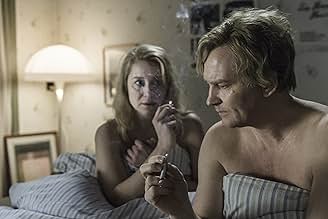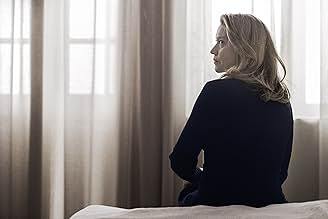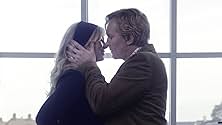AVALIAÇÃO DA IMDb
6,4/10
8,5 mil
SUA AVALIAÇÃO
Uma história sobre o choque entre desejos pessoais, solidariedade e tolerância em uma comuna dinamarquesa nos anos 70.Uma história sobre o choque entre desejos pessoais, solidariedade e tolerância em uma comuna dinamarquesa nos anos 70.Uma história sobre o choque entre desejos pessoais, solidariedade e tolerância em uma comuna dinamarquesa nos anos 70.
- Direção
- Roteiristas
- Artistas
- Prêmios
- 6 vitórias e 21 indicações no total
Avaliações em destaque
The emotional upheaval of a tightly-knit community has become Thomas Vinterberg's trademark as a film maker. He explored this theme with great success in 'Festen' and in 'Jagten', and now he does it in 'Kollektivet'. This time, the community is a group of people living together in a large house, a way of living that was trendy in the sixties and seventies. The group consists of friends and acquaintances of architect Erik and journalist Anna. Together, they fill up the huge villa he inherited from his parents. Anna thinks this social experiment can add some spice into her life. After all, she has been married to the same man and doing the same job for fifteen years.
But the cozy atmosphere of having meals and drinking beer together with a group of friends, turns sour when Erik introduces someone new into the group: his girlfriend, a young and pretty student. His wife Anna agrees with this arrangement, and in fact proposes it, hoping to keep Erik close to her. But predictably, the whole experiment ends in tears, fights and bitter reproaches.
Vinterberg's film has a different tone of voice than 'Festen' and 'Jagten'. It is a bit more lighthearted, and less harsh. He not only analyzes the emotional feelings of the characters, but also shows how society has changed in the last forty years. What struck me, was how easily Erik gets away with abject male-centred behaviour. He cheats on his wife practically in front of her eyes, and seems to have hardly any emotional connection to her or their daughter. In the end, it is his girlfriend who has to point out to him that his wife is having an emotional breakdown. But even then, he doesn't see the damage he has created. Instead, he complains that all these 'women issues' distract him from his work. Nowadays, a man would get a slap in the face after saying something like that.
The seventies-atmosphere adds an extra dimension to the film, and the period setting makes it an easier viewing experience than 'Jagten' or 'Festen'. At the same time, it is also less intense. It's nice to watch, but doesn't make you shift uneasily in your chair.
But the cozy atmosphere of having meals and drinking beer together with a group of friends, turns sour when Erik introduces someone new into the group: his girlfriend, a young and pretty student. His wife Anna agrees with this arrangement, and in fact proposes it, hoping to keep Erik close to her. But predictably, the whole experiment ends in tears, fights and bitter reproaches.
Vinterberg's film has a different tone of voice than 'Festen' and 'Jagten'. It is a bit more lighthearted, and less harsh. He not only analyzes the emotional feelings of the characters, but also shows how society has changed in the last forty years. What struck me, was how easily Erik gets away with abject male-centred behaviour. He cheats on his wife practically in front of her eyes, and seems to have hardly any emotional connection to her or their daughter. In the end, it is his girlfriend who has to point out to him that his wife is having an emotional breakdown. But even then, he doesn't see the damage he has created. Instead, he complains that all these 'women issues' distract him from his work. Nowadays, a man would get a slap in the face after saying something like that.
The seventies-atmosphere adds an extra dimension to the film, and the period setting makes it an easier viewing experience than 'Jagten' or 'Festen'. At the same time, it is also less intense. It's nice to watch, but doesn't make you shift uneasily in your chair.
Thomas Vinterberg performs an experiment / study of the human personality by gathering a gallery of characters (with whom it is difficult to identify yourself personally) and placing them in an extreme situation of coexistence. The supposed pragmatism or cold- blooded of Nordic people to face problems, here blows up. The ability of the director makes the viewer to take part inadvertently in the plot of the film as one more character of his work. Anna, TV presenter. and Erik professor of architecture form together with his teenage daughter an apparently happy family with no more complications than "the problem" of managing the use of a big inherited house. So great the house that they decide to share the use. The new experience begins with great joy but ends up in a dramatic way by crushing the promoter of the idea of sharing the house. It is interesting to observe the behavior of the teenage daughter through the story and also trying to understand how difficult it can be for a teacher accustomed himself to dominate students and situations from a position of strength to have to give up the domain of his house and almost his way of life for the general interest of a group composed by people whose specific weight is equal to nothing; the parasite that barely contribute, the "bums" that do not compromise themselves in anything, a liberal couple contributing to the experiment with a sick child who possibly might have been better brought up in the privacy of a normal home, etc. In summary, this film is full of teachings and is a great exercise in the expression of different behaviors, through the coexistence of a group of people with whom (out of the movie) it would be difficult to establish a friendship and still less to share your life. Finally highlight the great interpretation of the wife versus the weak of Erik's lover. talking of actresses terms, of course. The plot is set in 1970 but this fact is totally irrelevant.
"The Commune" brings the story of Eric and Anna. As the movie opens, we see the couple looking at the huge house of Erik's deceased father. The couple really can't afford to keep the house, but at Anna's suggestion, they invite several other people to join them (and pay rent). All together, they are now 9, of which 2 kids (including Anna and Erik's 14 yr. old daughter Freja). Then, just as things seem to go quite well, Erik starts an affair with Emma, a 24 yr. old student of his. What impact will that have on the commune? To tell you more of the plot would spoil your viewing experience, you'll just have to see for yourself how it all plays out.
Couple of comments: this is the latest movie from Danish writer-director Thomas Vinterberg, whose work includes 2015's "Far From the Madding Crowd" and before that, the excellent "Hunt" in 2012. Here, after going "Hollywood" in his previous movie, he returns to his Danish roots and brings us a story set in the 1970s, when the concept of morality and conformity were quite different from what we now know them to be. This movie turned out to be a bit different from what I expected it to be. It's not really about "hippies living together and being one with nature", but rather a study of what one man's affair means for the immediate group around him, including of course first and foremost his wife, a slightly aging but very popular TV news anchor. The film also spends quite of time looking at the 14 yr. old girl, and in that sense is also partly a coming of age movie. There are a couple of acting performances that will knock you out, none more so that Trine Dyrholm in the role of Anna, but Ulrich Thomsen as Erik certainly should be mentioned to.
I recently saw "The Commune" at the Landmark E Street Cinema in Washington DC. The Saturday evening screening that I saw it at was attended okay but not super. That's a shame, but maybe this movie will find a wider audience on Amazon Instant Video or eventually on DVD/Blu-ray. If you are in the mood for a quality foreign film that is in part a relationship drama and in part a coming-of-age movie, I'd readily recommend you see this out.
Couple of comments: this is the latest movie from Danish writer-director Thomas Vinterberg, whose work includes 2015's "Far From the Madding Crowd" and before that, the excellent "Hunt" in 2012. Here, after going "Hollywood" in his previous movie, he returns to his Danish roots and brings us a story set in the 1970s, when the concept of morality and conformity were quite different from what we now know them to be. This movie turned out to be a bit different from what I expected it to be. It's not really about "hippies living together and being one with nature", but rather a study of what one man's affair means for the immediate group around him, including of course first and foremost his wife, a slightly aging but very popular TV news anchor. The film also spends quite of time looking at the 14 yr. old girl, and in that sense is also partly a coming of age movie. There are a couple of acting performances that will knock you out, none more so that Trine Dyrholm in the role of Anna, but Ulrich Thomsen as Erik certainly should be mentioned to.
I recently saw "The Commune" at the Landmark E Street Cinema in Washington DC. The Saturday evening screening that I saw it at was attended okay but not super. That's a shame, but maybe this movie will find a wider audience on Amazon Instant Video or eventually on DVD/Blu-ray. If you are in the mood for a quality foreign film that is in part a relationship drama and in part a coming-of-age movie, I'd readily recommend you see this out.
Vinterberg, understandably having grown up in a commune, doesn't properly establish the hippy commune lifestyle. Probably because to him, that's just what he grew up with. He assumes you already know (and I do) but most people don't (or haven't thought about it) so the film feels severely lacking in world building. If this movie were an essay the first paragraph with the hypothesis is missing. Tell us a little bit about the ideology behind the choice in lifestyle; you did it beautifully did with Druk! Without it, the dramatic, emotional and ideological arithmetic doesn't quite add up. Have Ole tells us a bit about his left wing literature! Not to mention, Vinterberg shares nothing of the drug culture that the hippy lifestyle so adamantly relies on. Squash any human instinct/desire with a physical simulation; that's the hippy way. Feel unhappy: drink. You don't get that spark from learning something new? Just take a smoke and you'll get that spark relearning things you already know. Everything is material for the hippy, everything superficial. Real emotions always denied because we have pills for that! This film severely lacked a proper set up of that world in the first half.
That being said, this film develops into a deeply pertinent and important message. He perfectly diagnoses the problems with a hippy approach to a family structure. And I know this because my own family was a victim of this way of life. The mom in the film is my mom. The dad is my dad. The people in the film are from 70s Denmark, and my parents are from 90s LA. And while we live miles apart, the way of thinking leads to the same outcomes, and I have to repeat: Vinterberg perfectly diagnoses the problem with this type of thinking. While the woman may be the one suggesting a free love lifestyle, it's ultimately the women who will always suffer. The patriarch is to blame because he is the leader, whether or not he rhetorically offloads his duty to others.
The institution of marriage protects women, as their prospects of love virtually become null and void once they become old and ugly. The man however can remarry. This is why marriage exists. My parents were stupid enough to never make this observation and like in the movie, my mom ended up hooked on pills and alcohol while my father ran off with his tight new muse. And if you think the corporate world has any interest in supporting old women, think again.
That being said, this film develops into a deeply pertinent and important message. He perfectly diagnoses the problems with a hippy approach to a family structure. And I know this because my own family was a victim of this way of life. The mom in the film is my mom. The dad is my dad. The people in the film are from 70s Denmark, and my parents are from 90s LA. And while we live miles apart, the way of thinking leads to the same outcomes, and I have to repeat: Vinterberg perfectly diagnoses the problem with this type of thinking. While the woman may be the one suggesting a free love lifestyle, it's ultimately the women who will always suffer. The patriarch is to blame because he is the leader, whether or not he rhetorically offloads his duty to others.
The institution of marriage protects women, as their prospects of love virtually become null and void once they become old and ugly. The man however can remarry. This is why marriage exists. My parents were stupid enough to never make this observation and like in the movie, my mom ended up hooked on pills and alcohol while my father ran off with his tight new muse. And if you think the corporate world has any interest in supporting old women, think again.
Less difficult to watch then The Hunt or Festen, Thomas Vinterberg's Kollektivet (The Commune) impresses with great cinematography and how successfully it seems to reconstruct the details of the sixties and seventies fashion in Copenhagen, Denmark. But at the same time, it fails to deliver a truly engaging story. It's an interesting story, it's an exotic story, but the situations presented are so unfamiliar for someone who hasn't even considered living in a commune that it simply makes the plot hard to relate to. The Danish director apparently grew in a commune, but that doesn't mean that the story is autobiographical. However, it is pretty obvious that such a subject couldn't be presented so convincingly by someone without the experience of living in a commune. European movies are more and more something of an alternative cinema treat and this movie is a quite a delight from that perspective. The alternative lifestyle of the protagonists is presented in such detail that it doesn't seem forced or artificial. Most of the characters have strong personalities, but these are kind of ignored, as the pace is too quick to stop for them. Ultimately, what truly sticks out in your memory hours even after watching the movie is a very sad love story. A story about allowing extreme changes to your lifestyle and then having to bear all the consequences, with all the associated happiness and tears. "Maybe this is what people use to do in the Northern parts of Europe, I don't know what to say" was the first reaction of someone in the audience that I overheard at the European Film Festival, after the Bucharest opening screening. I kind of agreed. It is quite difficult to relate to a movie about an extreme leftist commune from Denmark. However, if you like strange stories that show with great talent a historical time and place, then The Commune is something you might fully appreciate. Yes, the action could also take place in a more modern setting, as the world is full of communes. However, what really makes this movie watchable is the love invested in recreating the look & feel of a defunct 20th century decade as seen and felt in a Northern Europe capital by a truly talented and hard- working director.
Você sabia?
- CuriosidadesThe film is based on Thomas Vinterberg's play of the same name, which is inspired by his colourful childhood in an academic commune north of Copenhagen.
- Erros de gravaçãoThe signs on the bus stops were not introduced until the late 80's or 90's.
Principais escolhas
Faça login para avaliar e ver a lista de recomendações personalizadas
- How long is The Commune?Fornecido pela Alexa
Detalhes
Bilheteria
- Faturamento bruto nos EUA e Canadá
- US$ 38.737
- Fim de semana de estreia nos EUA e Canadá
- US$ 9.249
- 21 de mai. de 2017
- Faturamento bruto mundial
- US$ 4.410.339
- Tempo de duração1 hora 51 minutos
- Cor
- Mixagem de som
- Proporção
- 2.35 : 1
Contribua para esta página
Sugerir uma alteração ou adicionar conteúdo ausente

Principal brecha
By what name was A Comunidade (2016) officially released in India in English?
Responda




























